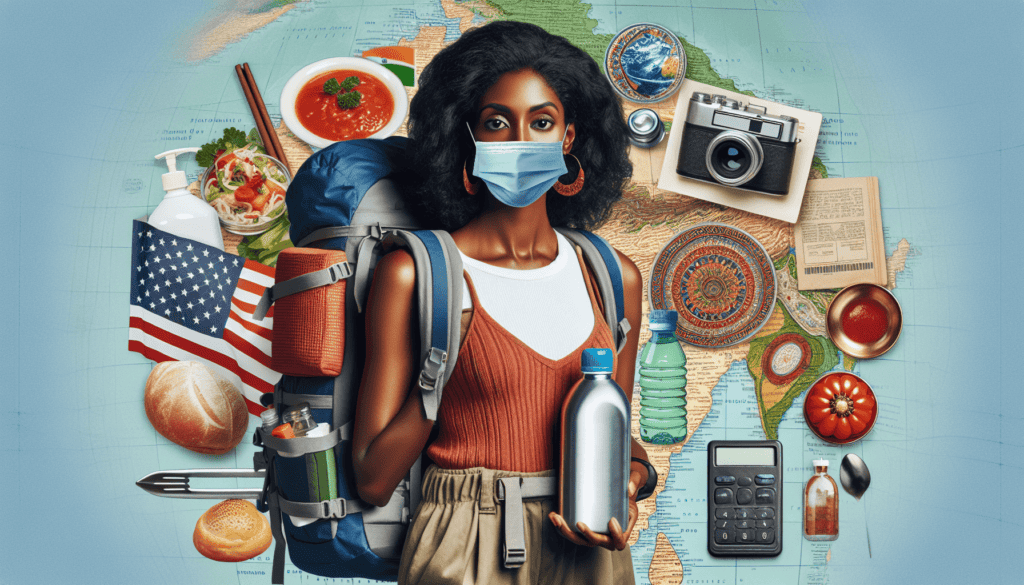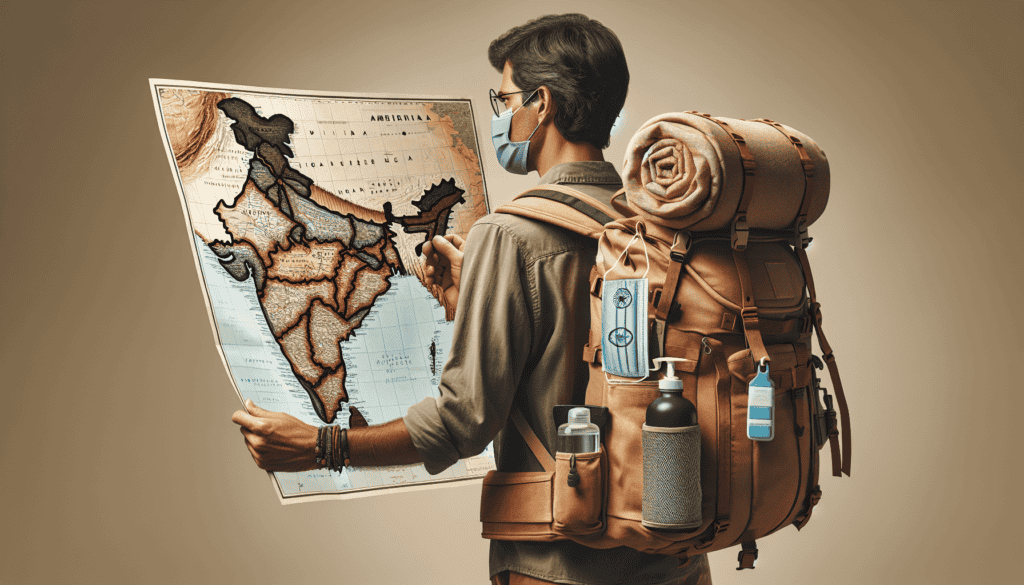Planning and visiting India as an american tourist can be as thrilling as it is daunting. With a culture vastly different from America, India promises to take you on a journey of dazzling diversity, rich traditions, and mouth-watering cuisine. But to ensure that this adventure remains purely enchanting and devoid of mishaps, your safety must take priority. “Explore The Top Safety Tips For American Tourists Traveling To India” is here to offer you first-hand knowledge on how to safeguard yourself, your belongings, and your well-being during your trip to this mesmerizing country. So buckle up for a fantastic voyage and rest assured, with these tips, your comfort and security are in good hands.
Understanding Indian Culture; Visiting India as an American Tourist
Traveling to India can be an enriching and transformative experience. The country’s vibrant culture, which has been shaped by thousands of years of history, is one of its main attractions. However, to fully enjoy your journey and avoid misunderstandings, it’s crucial to understand and respect the local customs and traditions.
Respect local customs and traditions
India is a country steeped in traditions and customs. From religious practices to societal norms, you’ll find age-old traditions that are still alive and respected by locals. While visiting their places of worship, such as temples, mosques, and churches, you should observe silence and follow their protocols. Many Indian customs may seem unique or different from what you’re used to, like greeting others with “Namaste” (by joining your hands) instead of handshakes or hugs. It’s an integral part of their culture and showing respect to these practices will certainly enhance your experience.
Dressing according to regional customs
India is quite diverse and the dress code changes with each region. However, modest dressing is generally appreciated throughout the country. It’s advised to avoid revealing or skimpy outfits, especially in rural or religious areas. When visiting religious sites, it’s important to cover your shoulders and knees. In some temples, you may be required to remove your shoes before entering, considering it a sign of respect.
Importance of religious sensitivity
Religion plays a crucial role in the lives of many Indians. Hindus, Muslims, Christians, Sikhs, Buddhists, and Jains live here in harmony and it’s important to respect each religion. Avoid making derogatory or disrespectful comments or gestures about any faith. During your stay, you may witness various religious ceremonies and festivals. Participating in them can give you a deeper insight into their culture but remember to always treat these activities with respect.
Health Precautions
Before embarking on your journey to India, it’s important to make adequate health preparations. This includes vaccinations, food, and water precautions which can go a long way in ensuring a healthy and enjoyable trip.
Recommended vaccinations for traveling to India
It’s advised to consult with your doctor or a travel clinic at least 4-6 weeks before your trip to discuss necessary vaccinations or medications. Commonly recommended vaccines for traveling to India include Hepatitis A, Hepatitis B, Typhoid, Japanese Encephalitis, and Rabies, among others.
Avoiding street food
Indian street food is a tantalizing treat, often hard to resist. However, to avoid potential health issues like ‘Delhi Belly’ it’s suggested that you refrain from street food or at least be very selective. Not every street food vendor may follow proper hygiene standards, and the change in diet can result in stomach discomfort.
Staying hydrated and avoiding water-borne diseases
Staying hydrated during your journey, especially given India’s hot climate, is essential. However, avoid drinking tap water or using it to brush your teeth, as it can cause waterborne diseases. Always opt for bottled water from a reliable brand, ensuring the seal is intact at the time of purchase.
Safety Measures in Public Places
Keeping safety in mind when traveling to any foreign country is necessary, and India is no different. Familiarize yourself with certain safety measures to ensure a worry-free trip.
Being cautious in crowded places
India is known for its densely populated cities. Be cautious while navigating through crowded places, such as local markets, train stations, or popular tourist attractions. These areas can sometimes be hotspots for pickpockets or snatch theft.
Avoiding late night outings
As a general rule, it’s safer to avoid venturing out late at night, especially if you’re alone or in relatively isolated places. Stick to well-lit and populated areas and try to travel in groups whenever possible.
Keeping an eye on personal belongings
Always keep an eye on your belongings, particularly in crowded places. Hold on to your purse or bag and keep your money, passports, and other valuables securely hidden away. In case of loss, it helps if you’ve saved copies of your passport and important documents elsewhere.
Interaction with Locals
India is known for its warm and friendly people. Interacting with locals can profoundly enrich your travel experience, but there are some basic guidelines you should follow during these interactions.
Being polite but cautious while interacting with locals
Indians are generally very welcoming and helpful. Often, locals will readily offer help or engage in conversation. While friendly discussions can provide valuable local insights, remain cautious and always maintain your personal space.
Avoid revealing too much personal or financial information
Just as you would anywhere else, avoid revealing too much personal or financial information to people you’ve just met. Be wary of anyone who seems overly interested in your personal affairs or financial situation.
Understanding common signs of scams and fraud
Every country has its share of scamsters and fraudsters. Beware of “too good to be true” deals, overfriendly strangers who wish to take you to specific shops, or offers for “cheap” travel tours. Trust your intuition and if something does not feel right, remove yourself from the situation.
Transportation Safety
Safe travel also involves selecting and using safe modes of transportation. In India, transportation can range from trains and buses to taxis and auto rickshaws.
Selecting safe modes of transportation
Public transportation is widely used in India. However, opt for more reputable companies or services when available. For instance, using app-based services like Uber or Ola for cab rides as they offer safety features like ride-sharing and emergency contacts.
Avoiding overcrowded public transport
Trains and buses in India can sometimes get extremely crowded, particularly during peak hours or festive seasons. Overcrowded public transport can be uncomfortable and possibly unsafe, so try to avoid travelling in them when they are at their busiest.
Being cautious while using taxis or auto rickshaws
While taxis and auto rickshaws are common modes of transportation in India, it’s recommended to agree on a fare before starting your ride to avoid confusion or disagreement at the end of your journey. It’s also safer to avoid hopping into empty or non-metered taxis or rickshaws late at night.
Emergency Contact Information
Having knowledge of the local emergency contact numbers is important for immediate assistance in case of emergencies.
Keeping local emergency contact numbers
You should keep handy the general emergency number in India: 112. Also, you can dial 100 for the police, 101 for fire emergencies, and 102 or 108 for medical emergencies.
Location and contact details of U.S. embassy/consulates
Knowing the location and contact details of your country’s embassy or consulates is crucial during emergencies. The U.S. Embassy and Consulates in India provide services to U.S. citizens, including in emergency situations. Make sure to have their contact information handy before you travel.
Accommodation Safety
When it comes to accommodations, it’s always better to stay safe than sorry. Picking reputable establishments can go a long way in ensuring a peaceful stay.
Staying in reputable hotels
Opt for well-reviewed and popular hotels or accommodations whenever possible. They are more likely to have reliable service, better safety standards, and helpful staff. Also, ensure your lodging has proper security measures like strong door locks and safes.
Ensuring rooms or lodgings have adequate security measures
Regardless of where you stay, always check that there are sufficient security measures in place. This includes secure locks on doors and windows, working CCTV cameras, the presence of security personnel, and emergency response procedures.
Money and Valuables
Being careful with your money and valuables can help prevent unwanted stress during your journey.
Avoiding carrying large amounts of cash
It’s always safer to avoid carrying large amounts of cash while traveling. Utilize credit and debit cards or travelers checks. There are ATMs everywhere in India, so withdrawing small amounts as and when needed should not be a problem.
Using credit and debit cards wisely
While cards are often a safer and more convenient choice, be sure to inform your bank about your travel plans to avoid any potential blocks on your card. Also, be aware of your surroundings when using ATMs and shield your PIN number to protect against over-the-shoulder snoops.
Keeping valuables in a safe place
Try to avoid bringing any unnecessary valuables on your journey. For the valuables that you do bring, such as passports, additional money, or expensive jewelry, make use of the safe box provided at your hotel or accommodation.
Travel Insurance
Travel insurance is a prudent way to protect yourself from unexpected mishaps during your journey.
Importance of having a comprehensive travel insurance
From medical expenses to trip cancellation, travel insurance comes in handy. It’s always advisable to have a comprehensive travel insurance policy that caters to your needs and covers you for any unexpected incident or accident.
Understanding the travel insurance policy coverage
Take the time to understand exactly what your travel insurance policy covers, keeping an eye out for exclusions. It’s best to ensure that it covers potential issues you may face, including but not limited to health issues, travel disruptions, accidents, and loss or theft of valuables.
Respecting India’s Laws and Regulations
When traveling to any foreign country, it’s crucial to abide by its laws and regulations. Familiarize yourself with the local laws to ensure you don’t unwittingly commit any legal infringements.
Understanding drug laws
India has stringent drug laws. Carrying, consuming, or trading any kind of narcotic substances is a criminal offense and is punishable with severe penalties. Make sure you strictly abide by these laws to avoid legal trouble.
Avoiding involvement in any political protests or demonstrations
Avoid participating in local political activities, protests, or demonstrations. These events can potentially escalate into violence unpredictably, putting your safety at risk.
Respecting wildlife and environmental laws
India is home to diverse flora and fauna. Avoid activities that can harm the environment or wildlife. Engaging in illegal activities like hunting, poaching, or deforestation can lead to hefty fines or severe legal penalties.
In conclusion, being aware and informed about these safety measures will not only ensure that your trip to India is safe but also enrich your travel experience. Enjoy the vibrant culture, delicious food, scenic beauty, and warm people of India while being mindful of your health, safety, and the laws of the land.


